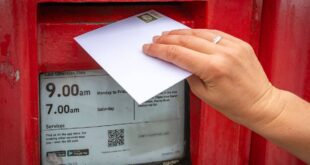Taxpayers have until the end of today (31 January) to file their self-assessment tax return and avoid a penalty fee for lateness.
Last week, there were still 3.4 million workers who were yet to complete and pay their contributions for the 2023/24 tax year.
You need to file a return if you:
- Are self-employed as a ‘sole trader’ and earned more than £1,000
- Had a taxable income of more than £150,000
- Are a partner in a business partnership
- Had to pay capital gains tax (CGT) when you sold something that increased in value (e.g., a property)
- Had to pay the high-income Child Benefit payment
You may also be required to complete a return if you have earned income that has not yet been taxed, which might be if you are a landlord who has received rent for a property or if you have tips and commission that have not been taxed.
Other circumstances include any earnings you’ve made abroad or income from savings, dividends or investments.
Wellness and wellbeing holidays: Travel insurance is essential for your peace of mind
Out of the pandemic lockdowns, there’s a greater emphasis on wellbeing and wellness, with
Sponsored by Post Office
If you have made over £1,000 from selling products online through marketplaces like eBay, Vinted or Etsy, you will also need to complete a return.
The ‘side hustle’ tax will impact around a third of all Brits, according to research from Finder.
Due to the rise in popularity of the money-making method, HMRC launched a tool for side hustlers to check if the sales of goods or services provided means you are obliged to make a contribution to the Treasury.
If you miss today’s deadline, you will need to pay £100 as a late payment penalty even if you have no tax to pay, which rises with interest the longer the delay.
The fines increase as follows:
- After three months, additional daily penalties of £10 per day, up to a maximum of £900
- After six months, a further penalty of 5% of the tax due or £300, whichever is greater
- After 12 months, another 5% or £300 charge, whichever is greater
‘Get relevant info before picking up the phone’
Last year, almost half a million workers in the UK missed the end-of-month deadline, and Alastair Douglas, CEO of TotallyMoney, has urged taxpayers to act quickly.
Douglas said: “If you’re having trouble with your online return, then it’s best to get all the relevant information together before you pick up the phone.
“This should include your 10-digit Unique Taxpayer Reference, National Insurance number, details of your income, expenses and benefits, and any charitable and pension contributions.
“There are just a few hours left, and the phone lines are likely to get busier as the day goes on, so get in touch as soon as possible – the HMRC hotline is 0300 200 3820.
“Remember that it’s not just your return that needs to be submitted, but you’ll be expected to pay the tax owed, too. You can challenge penalties in some circumstances – as long as you can prove you have a reasonable excuse.
“These may include the death of a close relative or partner, you had a serious mental or physical illness, an unexpected hospital stay, fire, flood or theft [that] stopped you from submitting your return, or somebody who you relied on sending your return didn’t.”
If you are concerned about the level of tax you have to pay, there are options to split the cost into more manageable chunks.
Douglas added: “You might be able to set up a Budget Payment Plan, meaning you can set up weekly or monthly direct debits. However, the taxman will charge interest at 7.25%, which, along with fees, can quickly start adding up.
“To apply for a payment plan, you’ll need to be able to tell HMRC how much you can afford to repay if there are other taxes you need to pay, your income and expenditure, and details of your savings and investments.”
Don’t panic if you make a mistake
As well as not missing the deadline, completing it correctly is important. But if you have made an error, you do not need to panic, said Mike Parkes, technical director at GoSimpleTax.
He said: “Mistakes in self-assessment tax returns are not uncommon, especially for newly self-employed people who are filling them out for the first time.
“Errors such as missed income or expenses, ticking the wrong box, or incorrectly adding up their figures can happen. The most important thing is to act quickly to fix any mistakes.
“HMRC allows you to correct errors in your tax return up to 12 months after the filing deadline. This means that those filing their 2023/2024 returns by 31st January 2025 will have a year to make amendments. You will need to wait 72 hours after filing before updating the return, but changes made online will adjust your tax bill immediately.”
Parkes added: “Minor mistakes made in good faith are unlikely to incur a penalty, especially if you admit the mistake proactively. However, errors should never be ignored. If HMRC suspects you have deliberately falsified information within your tax return, it could launch an investigation and you could be left with a far higher tax bill plus additional penalties.
“If the 12-month correction window has passed, you can still request changes by writing to HMRC, and if they notice any minor errors, they may correct them or contact you for clarification.
“Errors could result in your tax bill increasing or decreasing and a refund if you have overpaid tax. You can claim overpayment relief up to four years after the end of the relevant tax year.”



